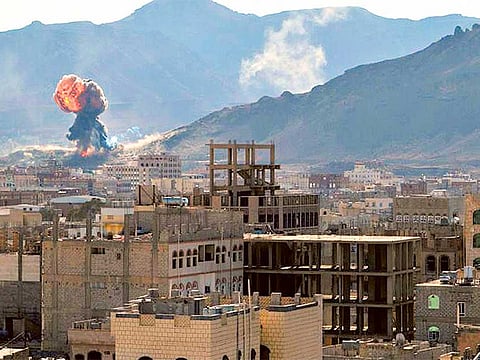Tensions high but Yemen ceasefire holds
Pitched battles erupt near the presidential palace and across Sana’a

SANA’A
Tensions ran high in Yemen’s capital Sana’a on Tuesday but a ceasefire appeared to be holding after heavy clashes between Houthi militia and the army threatened the US-backed government’s fragile grip on power.
The militiamen were surrounding the prime minister’s residence and had deployed not far from the entrance to the presidential palace.
Talks were expected later on Tuesday in a bid to ease tensions, after the government called for an “urgent meeting” to produce a road map to end violence.
Pitched battles erupted near the presidential palace and in other parts of Sana’a on Monday, in the biggest challenge yet to President Abd Rabbo Mansour Hadi’s rule.
A ceasefire was announced after several hours of clashes between troops and the Houthis, who overran Sana’a in September.
The militia tightened its grip on the capital, seizing an army base overlooking the presidential palace and taking control of state media.
At least nine people were killed, including fighters from both sides, and 67 wounded.
Yemen has been wracked by unrest for months, raising fears of a collapse of Hadi’s government, a crucial ally in Washington’s fight against Al Qaida.
Prime Minister Khalid Bahah escaped to his residence, where he has lived since taking office in October, after his convoy came under fire from Houthi fighters during Monday’s battles.
Heavily armed Houthis took up positions outside the residence late on Monday and were in control of all three of its entrances, government spokesman Rajih Badi said.
At the presidential palace, Houthi militiamen were deployed only 500 metres from the entrance.
Presidential guard forces, heavily armed and equipped with armoured vehicles and anti-aircraft guns, were protecting the palace.
Several foreign missions were shut during the fighting. The French embassy remained closed on Tuesday, but others had reopened, including the British and Dutch missions, diplomatic sources said.
Tensions have been running high in Sana’a since the Houthis on Saturday abducted Hadi’s chief of staff, Ahmad Awad Bin Mubarak, in an apparent move to extract changes to a draft constitution that he is overseeing.
Mubarak is in charge of a “national dialogue” set up after veteran strongman Ali Abdullah Saleh was forced from power in February 2012 following a year of bloody Arab Spring-inspired protests.
Saleh has been accused of backing the Houthis and a source in the presidential guard said some Yemeni troops still loyal to the ex-leader had supported the militia in Monday’s fighting.
The source, speaking on condition of anonymity, said several groups of soldiers and fighters left the Sana’a home of Saleh’s son Ahmad, “to lend a hand to Houthi fighters”.
Residents said some soldiers had also abandoned their positions on the hill overlooking the presidential palace without any resistance to the Houthis.
A Houthi fighter, who gave his name as Abu Hashem, said the militia had taken control of the area to prevent government forces from “shelling civilians”.
Before his kidnapping, Mubarak had been due to present a draft constitution dividing Yemen into a six-region federation, which the Houthis oppose.
The militants, who hail from Yemen’s remote north and fought a decade-long war against the government, have rejected the decentralisation plan, claiming it divides the country into rich and poor regions.
Since their takeover of the capital, the Houthis, also known as Ansar Allah, have pressed their advance into areas south of Sana’a, where they have met deadly resistance from Sunnis including Al Qaida loyalists.
Yemen’s branch of the terror network, Al Qaida in the Arabian Peninsula, is considered its most dangerous and claimed responsibility for this month’s attack in Paris on French satirical weekly Charlie Hebdo that left 12 dead.
Hadi’s government has been a key ally of the US, allowing Washington to carry out repeated drone attacks on Al Qaida militants in its territory.
Sign up for the Daily Briefing
Get the latest news and updates straight to your inbox



